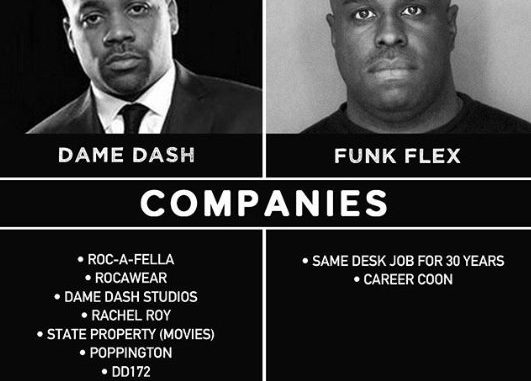
Black Dot comes all the way with it in his response to the comments by Funkmaster Flex, about Dame Dash, while taking Lyor Cohen’s side. Without holding back at all, this is an example of “Free black media”, where these ideas are expressed without overseers. Talking, directly about a reality, of the ‘relationship between Jews and Blacks‘, historically in this country.
For Flex to focus on how much money Dame and Jay made from the ‘relationship’, is to miss Dame’s entire point. Lyor and his partners still made more money, and continue to make money from that deal. Meanwhile, several artists came and went – and like so many of our artistic greats, die broke; while these, ‘outsiders’, position themselves and their families for generational wealth…. off of our backs.
Black Dot responds to Funkmaster Flex, on Lyor Cohen vs. Dame Dash.
I had to agree with his commentary here. It looks and sounds like Flex is ‘trying to get something’ in return for this. “If Lyor is not a culture vulture, then what the fuck is he??” – Black Dot, of Urban X Podcast.
In case you missed it: read and listen to commentary, as well as the live rant (recording) of Flex defending Lyor Cohen, against Dame Dash.
It’s not about the money: sure a few black people will make money in this entertainment business, that “we” do not control. Those who do control the industry, are mostly focused on controlling OUR narrative & image. When we look at the landscape of hip hop, far too many ‘non-blacks’ are in too many positions of power and influence.
Dame Dash responds: says Flex doesn’t speak Boss; he speaks Employee.
Black Dot’s Point; It’s gotta be “bigger than getting the bag” – Dame’s point is not about money…
Black Dot says, so long as it’s about the bag, too many of us will continue to sell out, just like Funkmaster Flex. We’ll defend the very people who are keeping black people from truly being our greater selves. Look at where hip hop ‘used’ to be, with rap groups that were speaking knowledge – and look where it is now. Common’s I Used to Love H.E.R. documents this ‘change’ in a industry that was moving black people in a positive direction.
Now, the music helps contribute to the downfall – of black people. Old heads cannot ‘blame’ the young acts or the youth who think these empty artists are ‘the ones’. David Banner recently spoke about this Same issue on “The Drink Champs” – how it’s our fault (older heads) for giving out bad advice. But also, how often people will give us money to keep us from truly expressing what we want to share, creatively with the world.
We have to have more intelligent conversations about money. There are too many traps set up for blacks to fall into, and many are set through our music. While we do understand, certain tales from the hood must be told, there has to be room for Solution Oriented Informative Entertainment too. The audience needs to know the importance of digesting quality lyrics, not just euphoric beats. When the two come together, that’s when hip hop is at it’s best.
